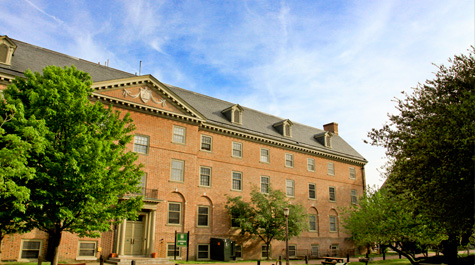Friday, Jan. 20, the College of William and Mary’s Residence Life office informed students living in Jefferson Hall that an assessment of the drinking water over break found levels of lead above the Environmental Protection Agency’s regulatory limit.
Administrators told students that there was not a violation of drinking water standards set by the EPA’s Safe Drinking Water Act and that the findings would not affect water usage for things like showering, but they did list steps that the College would be taking to ensure that lead levels decrease over the next few days.
“William & Mary’s Environment, Health & Safety office performed a quality assurance assessment of drinking water in residence halls over winter break,” Associate Vice President for Student Affairs and Director of Residence Life Deb Boykin ’76 M.Ed. ’82 said in an email. “Although the results of that testing showed no lead present in most of the 90 samples that were taken, two locations in Jefferson Hall — the sink faucets in the third-floor kitchen and the first-floor head resident apartment kitchen — were found [to] have lead levels above … 0.05 milligrams per liter.”
Vice President for Student Affairs Ginger Ambler ’88 Ph.D. ’06 followed up on Boykin’s email later Jan. 20, sending a campus-wide announcement to clarify the situation. According to Ambler, the College first decided to test the water quality after reading news reports that other colleges had found lead in their water.
Ambler said that all testing was done voluntarily and at the request of College administrators following this research. The Environment, Health and Safety office only found threshold levels of lead in Jefferson Hall and they initially took approximately 90 samples from 24 buildings over a two-day period.
According to Boykin, when the College tested follow-up samples in Jefferson Hall after running the water, the first-floor kitchen sample no longer had detectable levels of lead and the third-floor kitchen sample was below the EPA’s regulatory limit but above the EPA’s action level of 0.015 milligrams per liter.
Boykin advised students to run the tap until water is cold to the touch and to only use cold water for cooking and drinking. She also said that the College would be investigating potential sources of lead contamination.
“Your health and safety are of utmost importance to us, and I am grateful to our professionals in residence life, and environment, health and safety for proactively taking steps to ensure the quality of our water,” Ambler said in a campus-wide email.
Jefferson Hall resident Jo Rozycki ’20 said that she was unaware of any issues with the water until she read the email from Boykin, but had been concerned Jan. 19 when she noticed the tap water had a slight metallic taste, which she worried might have been related to the lead levels.
“I think all of my hall mates are taking the precautions the emails said to take,” Rozycki said. “It’s disconcerting since you live in a place where you wish to have clean, drinkable water, and I sincerely hope that the College makes the efforts to fix the situation.”
Another student, Sofia Kellogg ’20, said that she has decided to avoid drinking water that comes from the tap just as a precaution until Jefferson Hall residents are updated about the lead levels. Kathryn Anderson ’20 said that she is also waiting for an update as to how the College is handling the situation and is pleased that they will be continuing to test the water.
“It’s a little disturbing that there’s lead in our water, especially since I drink from our sink every day,” Kellogg said. “Since I got the email from Residence Life about the water, I’ve been using my Brita filter more often. I really hope they fix the problem soon.”
For Kelly Konrad ’20, the actions taken by her Resident Assistant and Orientation Aides helped her feel calm about the water in Jefferson Hall.
“My hall’s RA and OAs alerted us of the situation and told us that we should read the email notification carefully,” Konrad said. “I always fill up my water bottle with a Brita filter so I’m not too worried about it, especially since I don’t cook anything in the dorm, but it’s still a little scary to think about it. It has just further proven my [thoughts] that Jefferson needs some renovations.”
While students are taking the extra precautions that Ambler and Boykin suggested, many are staying focused on the fact that the water has not violated the Safe Drinking Water Act and does not pose a great threat.
Daphne Sink ’20 said that she believes that at the end of the day, these problems are just what one could expect from living in an older freshman dorm.
“While it is a little worrying to see the level of lead in the water,” Sink said. “It takes a lot of it to get sick. No one has been drinking straight out of the faucet all the time, so there are really no worries. Overall the whole situation [can] be [chalked] up to freshman dorm problems.”
Reporting contributed by Flat Hat Associate Sports Editor Alyssa Grzesiak ’20.

